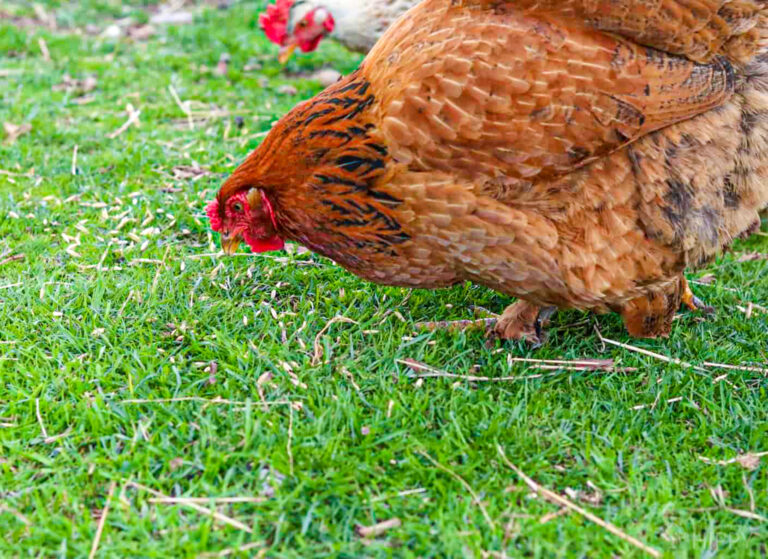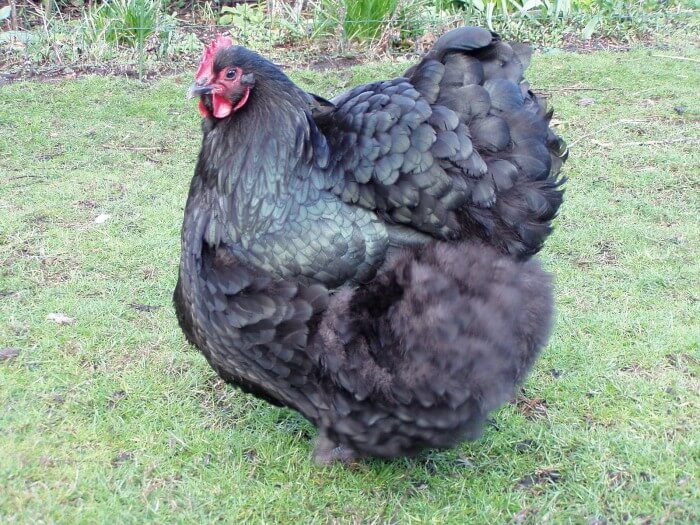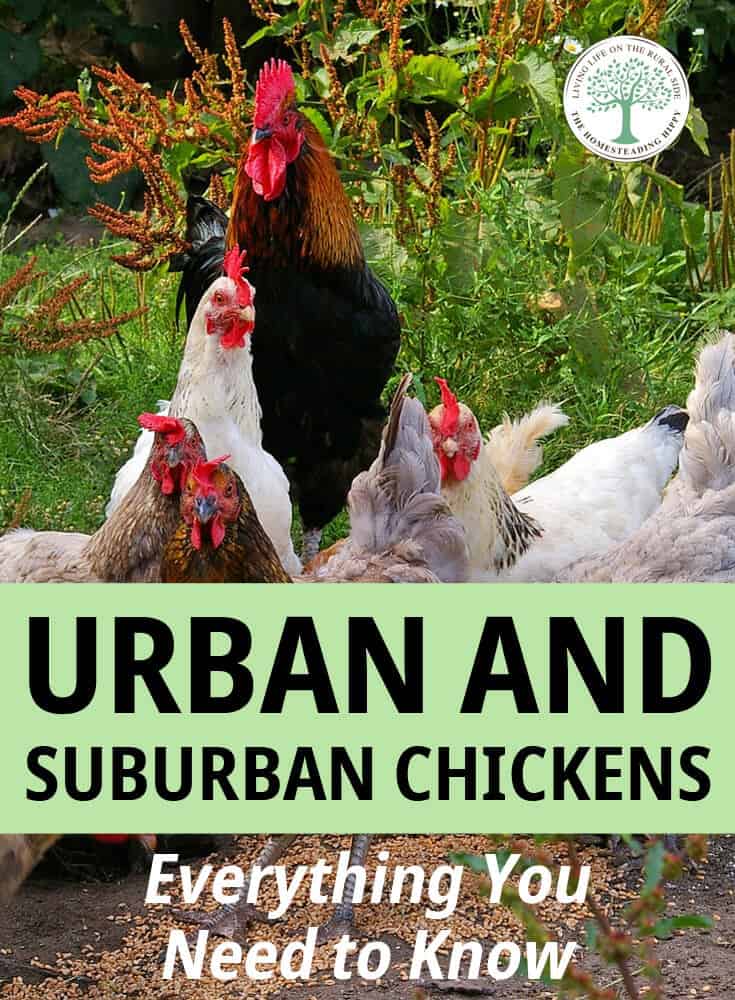I lived in a small townhouse with a tiny backyard. I squeezed in a garden, but what I really wanted was a few chickens for eggs, manure, and fun. My next-door neighbors promised they didn’t mind, but the township I lived in had different ideas about what I could do with my own backyard.

The laws in my township stated that you needed to have at least one acre of land to keep any farm animal, and I only had 1/10 of an acre. My dream of having even a few chickens just couldn’t happen where I lived. I was very disappointed, but I didn’t want to break the law.
Had I known then what I know now, I would have lobbied for a change in the local statutes so that anyone could keep a few chickens in their backyard.
Or, perhaps I would have raised a few rabbits or quail, which typically aren’t as regulated as chickens. I just didn’t know that any of those things were options.
Soon enough, I moved to another town, with a larger property, and happily began my foray into the world of chicken keeping. I live in a tiny town surrounded by farms and chicken keeping is as abundant as the foxes who like to eat them.
But not everyone can or wants to live in a rural or agricultural area. What would you do if you couldn’t move to the country but wanted to have chickens of your own? Here are a few ideas for urban and suburban homesteaders who want to keep chickens.
Check the laws.
Disclaimer. Before we begin, know that this is not legal advice, I am not a layer and I recommend you consult one to do things right. Neither me, nor the website thehomesteadinghippy.com or the company owning thehomesteadinghippy.com shall be held liable for damages you may incur as a result of applying the information in this article. This site does not create a client-attorney relationship wit you in any way, shape or form.
Don’t get chickens until you check out the local laws. Every state, county, and town or city has its own laws in regards to keeping animals, especially animals that are considered to be livestock, such as chickens and goats.
hese laws may be based on zoning, property size, proximity to other people or places, and housing type. You’ll need to check the local ordinances before doing anything else.
Every local government will have ordinances that deal with issues such as noise, pests, odors, sheds or coops, and proximity to other properties. You will want to check these out before you purchase coops, brooders, chicks, or eggs.
If you jump ahead and bring chickens home before you know the statutes, you may be breaking the local laws and ordinances. You could face hefty fines, removal of your chickens, and angry neighbors.
Do your research first! You don’t want to have to give up your chickens after you’ve made a financial and even emotional investment to bring them home.
Start with your township office and ask them who you need to speak with about keeping chickens in your location. The law may be confusing, and it may take a little sleuthing to find out who you need to speak to in order to find the right answer.
Make sure you speak to the right person, because some people may automatically assume that chickens are illegal in your municipality and won’t take the time to find out for sure.
There may even be conflicting laws that are difficult to interpret. Some communities participate in posting their codes online, at websites such as:
You might also google your municipality with words like zoning codes, municipal codes, animals, and laws. It’s good to know your laws as well as talk to the township office yourself.
When you find the code, look for sections such as animals (where they may tell you what animals are outlawed or require permits to keep), zoning codes (where they tell you what animals are legal in your municipality).
You may also want to look for information that pertains to sheds and coops, fencing, and pest control.
You’ll also want to check with your homeowner’s association or neighborhood for any restrictive neighborhood covenants. A restrictive covenant is an agreement that the home buyer assumers when purchasing the property.
A restrictive covenant prevents certain uses or activities which may cause harm to the property or adjoining property. It may also stipulate certain obligations, such as lawn mowing.
These covenants may prohibit any type of farm animal on your property, or it may dictate how many animals you are permitted to have based on the size of your property.
You probably won’t find information on restrictive covenants in the municipal code, you’ll have to check with your homeowners association, read the information about your property from when you purchased your home, and talk to your neighbors to see what they know.
You may need to check your lease if you are living on a rented property, because your landlord may not want animals on his or her property.
If the lease does not state that you can own farm animals, you may need to have your landlord put something in writing for you so that there are no questions or grounds for eviction.
For example, according to omlet.us, you can keep chickens in Pittsburgh, Harrisburg, and Philadelphia without a permit and with no restriction on numbers. But Reading, Pottstown, and Allentown prohibit keeping chickens altogether.
Laws can change, so do your due diligence to find out if your city or town will allow chickens and what restrictions might be imposed on their chicken keepers.
You’ll need to consider a number of chicken-keeping aspects before you get your chickens. How many of these have you researched?
- Permits. First, what permits do you need to keep chickens on our property? If you live in an urban or suburban area, you will probably need a permit just to have chickens. That permit may need to be renewed annually and will probably require a yearly fee.
- Flock size. The size of your flock may be regulated in your locale based on their restrictions or your property size. How many chickens will you be allowed to have?
- Rooster regulations. Some towns regulate the ownership of roosters but not hens. Roosters can be loud and aggressive, making them a risk for close-quartered living. Will your town allow you to keep a rooster? If not, what will you do if you have one?
- Chicken coops. What regulations are involved in building or having a chicken coop? You may need a separate permit and inspection to build or order your chicken coop. There may be restrictions on size, shape, and color.
- Cost of chicken coop and run. If you need to purchase a commercially built chicken coop, what size do you need? This depends on the size of your flock. Average full size chickens each need about 3 square feet of space in the chicken coop and about 10 square feet in the chicken run. If you have 3 chickens, you’ll need at least a 9 foot square coop with a 30 square foot run. More space is better, of course. Smaller chickens, such as bantams or silkies, can get by with less space. Do you have enough room in your backyard? How much is the cost of the chicken coop you will need?
- Distance from the property line. Some townships or cities will require your chicken coop to be a certain distance from any property line, so that your chicken activities will not infringe upon your neighbor’s rights. Do you have enough space in your yard to keep the coop a large enough distance away?
- Butchering rules. If you are raising your chickens for meat, you may need to reconsider. Most cities have ordinances against butchering in your own backyard. You may need to take your chickens elsewhere to be butchered if your town does not allow it. Or if you are permitted, but have a small backyard, it may be difficult to find space where your activities don’t offend the neighbors.
Change the Laws.
If your local laws don’t permit chickens, what can you do? Because of the growing food movements and interest in raising food, many towns and cities and reexamining their laws regarding chicken keeping and making revisions.
Now is a great time to act if you want to raise chickens and your city doesn’t allow it. But don’t just be a rebel and sneak some hens in your backyard, get out there and lobby for chicken-owners everywhere.
See what you can do to change the local laws. Here are some tips to help as you work to change the laws on chicken keeping.
Gather a team.
This is the time to educate your neighbors, friends, and family members on why keeping chickens in the suburbs or urban areas is a good idea. You will also need to address some of their natural concerns and misunderstandings about chickens.
They may not know that you can have eggs without roosters or that there are quieter breeds of chicken. They may not realize the benefits that come from owning chickens, such as manure, tick and bug control, and the idea that chickens can turn table scraps into eggs.
You can calm their fears about attracting predators, rats, and bugs with good information. And the promise of a few free eggs might be enough to win over even the most stubborn or concerned neighbors.
Find a few folks who will lend their support and their voice to this mission and get them on board to rally with you.
Get involved with your local government and learn who might be on your side.
Be supportive of other people’s missions and they might be support of yours, as well. Make sure you know what you want to accomplish. You might want to use other cities’ chicken laws as an example.
What cities near you will permit backyard chickens, and how is it working? What permits or fees do they require? Do they need inspections? How many chickens will they allow per household?
Also, look at the cities who do not allow chickens. Why? How will you address those issues? Find out what people are worried about and be prepared to address those issues in a positive manner.
It may take responding to two or three concerns to find out what a neighbor or councilperson is most concerned about in regards to keeping chickens.

Quiet Breeds
One issue that many folks worry about is the noise. Noise pollution is always of concern in the city, especially densely populated areas. Of course, roosters are the number one offender in the flock, as far as noisiness is concerned.
And that is easily managed by not housing any roosters because you really don’t need roosters for hens to lay eggs. You only need roosters if you want to hatch chicks.
However, there are a number of breeds of chicken that are quieter than others. Keep this information handy if people are worrying about the noise that a chicken makes.
Look for breeds of chicken that are more easygoing and laid back, as well as some quieter breeds. Here are few to get you started.
- Buff Orpingtons. Buff Opringtons are considered the teddy bears of the chicken world. They’ll learn to sit in your lap and be petted like a small dog, if you like. Their calm and quiet nature makes them great for small backyard flocks.
- Wyandottes. These hens are curious and friendly and very dependable layers. These hardy birds are great in summer and winter and are good birds for both meat and eggs. They’re not easily frightened and are quite content nosing around the yard near their owners.
- Bantams. Many breeds of chicken come in bantam sizes, but their small size lends well to backyard flocks. These birds are generally quiet and friendly and lay smaller sized eggs. The best thing about bantams is they don’t require a lot of space, so you can fit more birds in a smaller coop.
- Cochins. Cochins are large docile chickens. Their calm nature means they are also quiet. They are great layers and can also be used for meat.
- Brahmas. Brahmas are large, laid back chickens. They aren’t bothered by much, so they won’t raise an alarm in the backyard. They are quirky and fun to watch.
- Favorelles. These sweet chickens have cute little muffs and a cute, laidback personality to match. Their docile, quiet temperament makes them a great fit for the backyard flock.
Find more about quiet breeds here so you know which breeds of chicken make the best backyard flocks. For urban and suburban neighborhoods, where people are nearby, quiet laidback hens are a great choice for your backyard flock.
Predator Problems
While there are predators in the suburbs and the city, there are definitely less than in the country. You may have a few raccoons, egg-stealing skunks, and a fox or two.
There may be a small possibility of a coyote in the suburbs, but your biggest foe will be the local dogs and cats. A playful pup can make short work of a prized chicken without meaning to harm it.
You can easily control predator issues by keeping your hens in an enclosed run. For safe keeping, the best type of run to avoid predator problems is made from hardware cloth, which is tightly woven, small squares of wire.
Chicken wire will certainly keep chickens in, but it isn’t anywhere near strong enough to keep even suburban predators out. Hardware cloth or even a large wire dog kennel works better. You’ll need to dig your enclosure about a foot down in to the dirt to keep out digging predators, such as foxes.
While these predators will be drawn to your chickens, keep in mind that they already exist in the suburbs and the city.
Just by having chickens doesn’t mean you are creating more predators in the neighborhood. A properly maintained coop and run will go a long ways towards protecting your prized hens.
Odor Issues.
Nearby neighbors may be concerned with bad odors coming from your coop. There’s no getting around it, chickens can smell. Ammonia can build up in your chicken coop, causing an acrid smell that irritates the eyes, nose, and throat.
You can – and should – mitigate ammonia and other odors by regularly cleaning your chicken coop and properly disposing of soiled bedding.
Humidity will cause the odors to be more pungent, so provide adequate ventilation in your coop to keep humidity down and allow gases to escape.
Also, using enough bedding, such as straw or shavings, will help absorb moisture and odor. Stores such as Tractor Supply sell coop deodorizers which can further mitigate the smell of your chicken coop.
Make sure to clean up any spilled food, as wet food can have a gross smell. Promptly remove any deceased birds. The rainy season can mean your chicken run smells quite ripe. However, you can take a few steps to ensure that your run is in the driest area of your yard.
Also, if the run becomes waterlogged, you can add sand or mulch to promote drainage. Equine pelleted bedding works great in a soggy run.
The pellets will absorb excess moisture and then turn to dust. Continue adding layers of pellets until the odor is absorbed
Pest Problems.
One issue you may need to address with the neighbors or the township is the pests. Chickens can certainly attract things like rats, mice, and bugs of all sorts. However, all of these pesty problems can be mitigated with good preventative measures.
First, keep your chicken feed in metal trash cans with the lid tightly on. This will prevent mice and rats from having access to the feed.
Also, bring your chicken feeders and waterers in at night to cut way down on the chances of rodents finding it and coming back for more.
Remember, cities and even the suburbs can have rodent problems even without backyard fowl, you just don’t always see them. But they will leave visible evidence, such as chewing on feed bags and leaving feces around, if you don’t take the steps to control them.
Planting mint, lavender, and other herbs can help prevent mice and rats and other pests from taking up residence in your coops.
To prevent flies, make sure you keep your coop clean. Animal feces of any kind attracts flies, and chickens are no exception. Clean out your coop weekly and dispose of the waste in whatever manner the county deems best.
You may be able to compost your chicken manure to make great soil for your flowerbeds and garden, but you may need to dispose of it some other way if the city or town deems it necessary.
If you are going to make compost out of your chicken manure, you’ll need to mix it with plenty of carbons and wet it down so that the compost heats up enough to kill any fly eggs or bacteria present in the feces.
Health Concerns.
A study looked at 65 average chicken keepers. They found that most chicken keepers kept the chickens in such a way that chickens could live naturally and do normal chicken things. However:
“Disease prevention measures such as vaccination and biosecurity, including limiting the access of human visitors, wild birds and rodents to the flocks were rare.
A lack of avian and zoonotic disease knowledge and awareness among the owners has implications for disease control and highlights the need for improved communication between owners, authorities and veterinarians.”
In other words, although chicken keepers did a good job with housing and feeding, they were lacking on information regarding typical chicken diseases and issues.
Diseases such as Newcastle disease, infectious bronchitis, and Marek’s disease could mean serious health problems for backyard chickens and their owners, but these diseases could also accidentally be spread to other backyard coops and even commercial poultry farms.
A survey of flock owner’s in the United States showed similar concerns, indicating that more than half of all backyard flock owner’s did not vaccinate against Marek’s disease. Marek’s disease is fatal in chickens.
These health concerns, along with salmonella, may be good reason for cities to ban chickens in densely populated areas.
However, working closely with a veterinarian, practicing good biosecurity, keeping coops clean and hygienic, and controlling rodents can minimize some of these risks.
Good Fences Make Good Neighbors
One problem that might be a real deal breaker is wandering chickens. Sure, the neighbors may be amused if a cute little hen wanders into their yard once in a while.
But they might become quite upset if your hens are routinely kicking around their mulch, gobbling up their garden produce, or pooping on their porch.
A good fence might go a long way to making your neighbors happier with your chickens. A privacy fence might also keep a few prying eyes away from your chicken activities, especially if you butcher your own chickens on site.
Making Peace with the Neighbors
When we asked the township at our new home if we were permitted to have chickens, their only concern was whether or not it would bother the neighbors. Thankfully, the neighbors were open-minded to free-ranging chickens and enjoyed watching their antics.
Since they engaged in a few noisy activities themselves, such as dirt bikes and snowmobiles, they didn’t complain about the occasional rooster crow.
Of course, not all neighbors are as open to chickens, so you’ll need to do your due diligence to get them on your side.
Share some eggs, find a happy medium (maybe they won’t mind a few hens even if they can’t stand the roosters), or simply keep your chickens penned up in a clean, attractive chicken run.
If you live in close proximity to neighbors, you’ll want to make sure they are chicken allies and not your enemies.
There are many reasons to keep chickens in country, in the city, and in the suburbs. If you are a homesteader, a gardener, or just someone looking for a fun pet, chickens might be the right choice for you.
The provide meat, eggs, manure, and pest control and can easily be kept in a coop and run, fed grain or table scraps, and are lots of fun to watch and enjoy.
Whatever your reasons for chicken keeping, whether its sustainability or fun, you’ll want to make sure you check out all the laws and rules when it comes to backyard chicken keeping.
Follow the laws and keep your neighbors happy so you can enjoy your chickens -and their eggs- for years to come.


Amanda is a homesteader and a Jesus-loving, mother of 6 toddlers. She’s raising lots of fancy chickens and goats on her small homestead (among other things). Find out more about the team here.
